Q3 & Q4 2023
Hello everyone! I'm reconnecting with you all from my beloved little French village where I've spent the winter with my family. When I started writing this report, it was still January so even though it’s a little late for that now, I would like to wish you a beautiful and gentle 2024. May this new year bring peace to you and your loved ones.
Today is February 22nd and I am wrapping up this report after writing it for the second time. I kept procrastinating because I wasn’t happy with it. The first version was too “business as usual” and didn’t feel right. It simply wasn’t authentic which you know is not only a core value for us at Wild Audience but it is also a core value in my life. I guess I wasn’t ready to talk about it, felt the need to hide my grief maybe and even felt like it wasn’t “relevant” to talk about it at the time. In reality, this topic is one of the taboos in the workplace.
I lost my beloved father brutally and unexpectedly in October last year and the grief of his death has proved to be the most difficult experience. It has taken a toll on my emotional and physical health alike and as you can imagine this has impacted every aspect of my life including work. So this report is going to be a little bit more personal than usual and I’ll use my own experience to explore topics from navigating grief in the workplace to supporting a grieving co-worker or employee. Don’t worry I will also share a team update, progress on our culture projects and everything in between. I just think death and grief at work are important and not often talked about.
Here are some pictures of the beautiful winter we had in France:
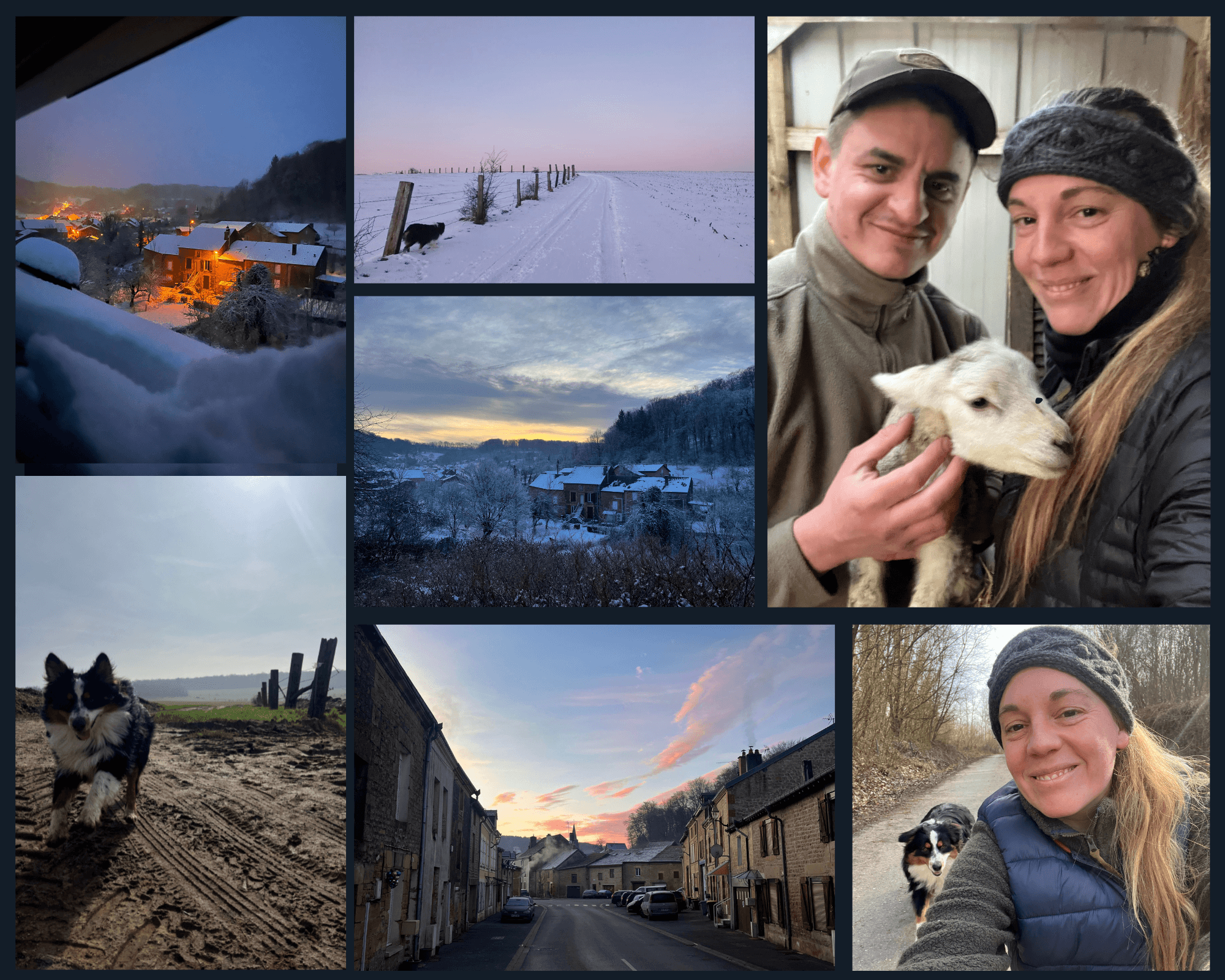
Before we start and in case you’re new around I am here to tell you the story of our team while we grow our products Wildmetrics and Wild Mail.
As you can guess from the title of this report, it's all about our people and the culture we are trying to build. I share my experiences, thoughts, and learnings as we progress on this journey and open up about the challenges and topics that are perhaps avoided sometimes.
You can find our past reports on our Culture page here. With no further due, welcome back to our Culture & People Report series!
Here is a quick team update from Q3 & Q4 2023:
Bastian has dedicated time to acquiring some new skills, delving into the worlds of gardening, growing food, bread-making, and kombucha brewing.
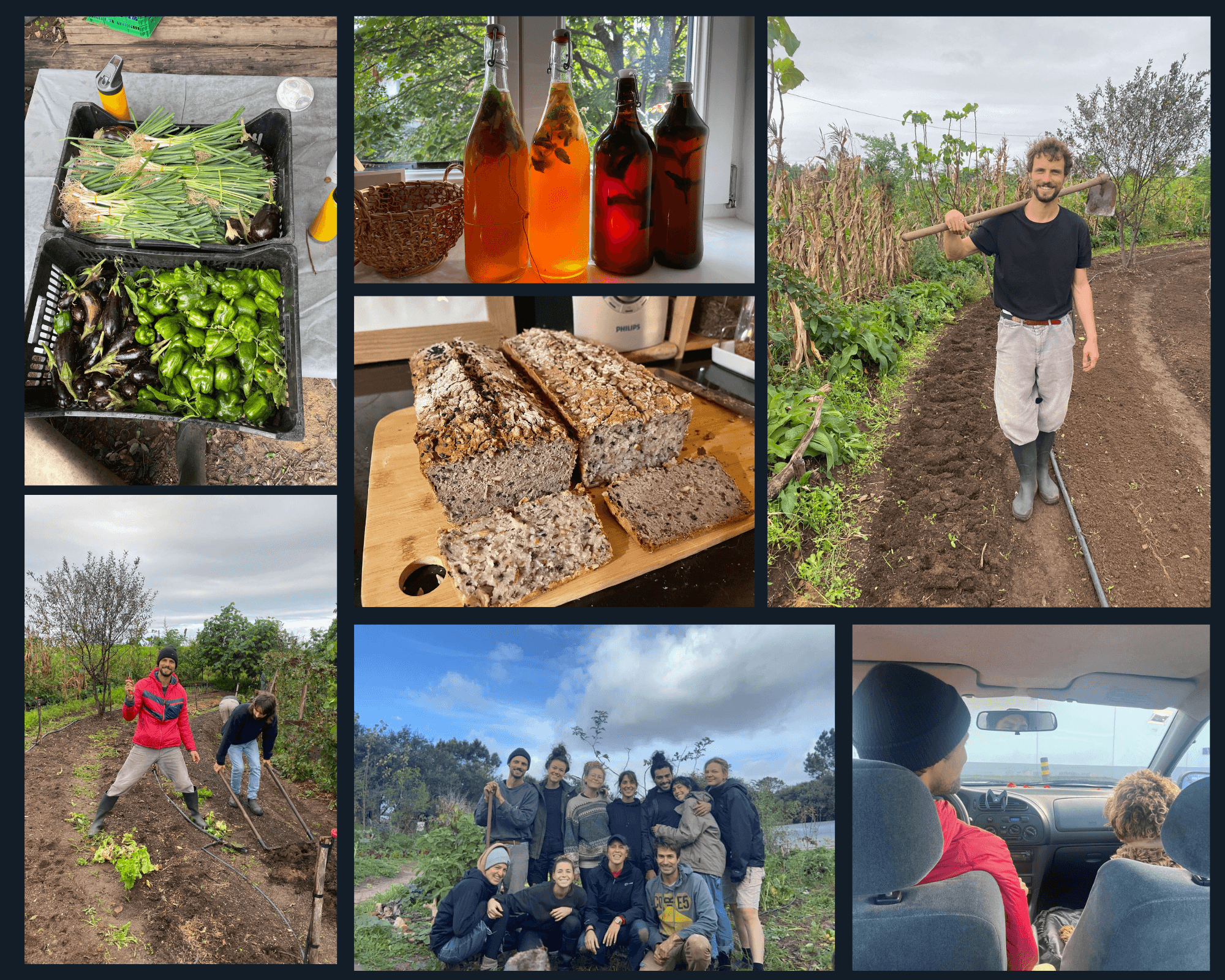
During the Christmas period, Benji took the opportunity to spend quality time with his family in Barcelona and went on a surfing trip, to Fuerteventura. He also went to a concert of his favorite DJ with his girlfriend, and with Alban plus his girlfriend and a friend of his. And he met up with some of the team in Barcelona and Valencia.
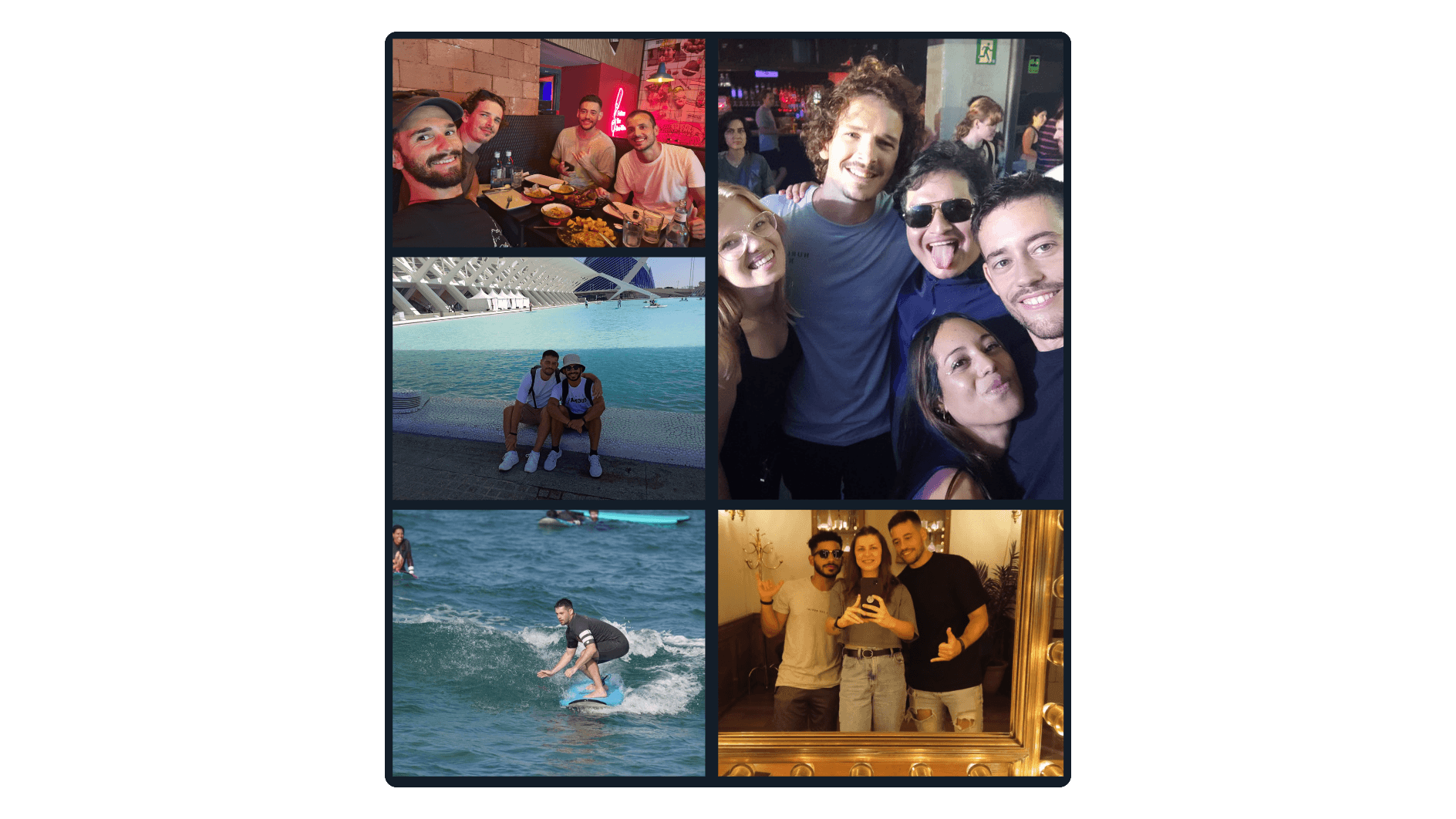
Alban had a busy time too, traveling to Finland with his girlfriend. They enjoyed swimming in the lake after sauna sessions and appreciated the overall beauty of nature. He also participated in his first Triathlon. Additionally, he took trips to Galicia and Rome and went wakeboarding in Barcelona with friends.

Pancho and his family traveled to Europe, primarily to reconnect with relatives in Germany. They also enjoyed a beach holiday in Sardinia and met with a team in Barcelona. Additionally, Pancho spent time practicing the drums in Argentina which is part of his weekly routine.
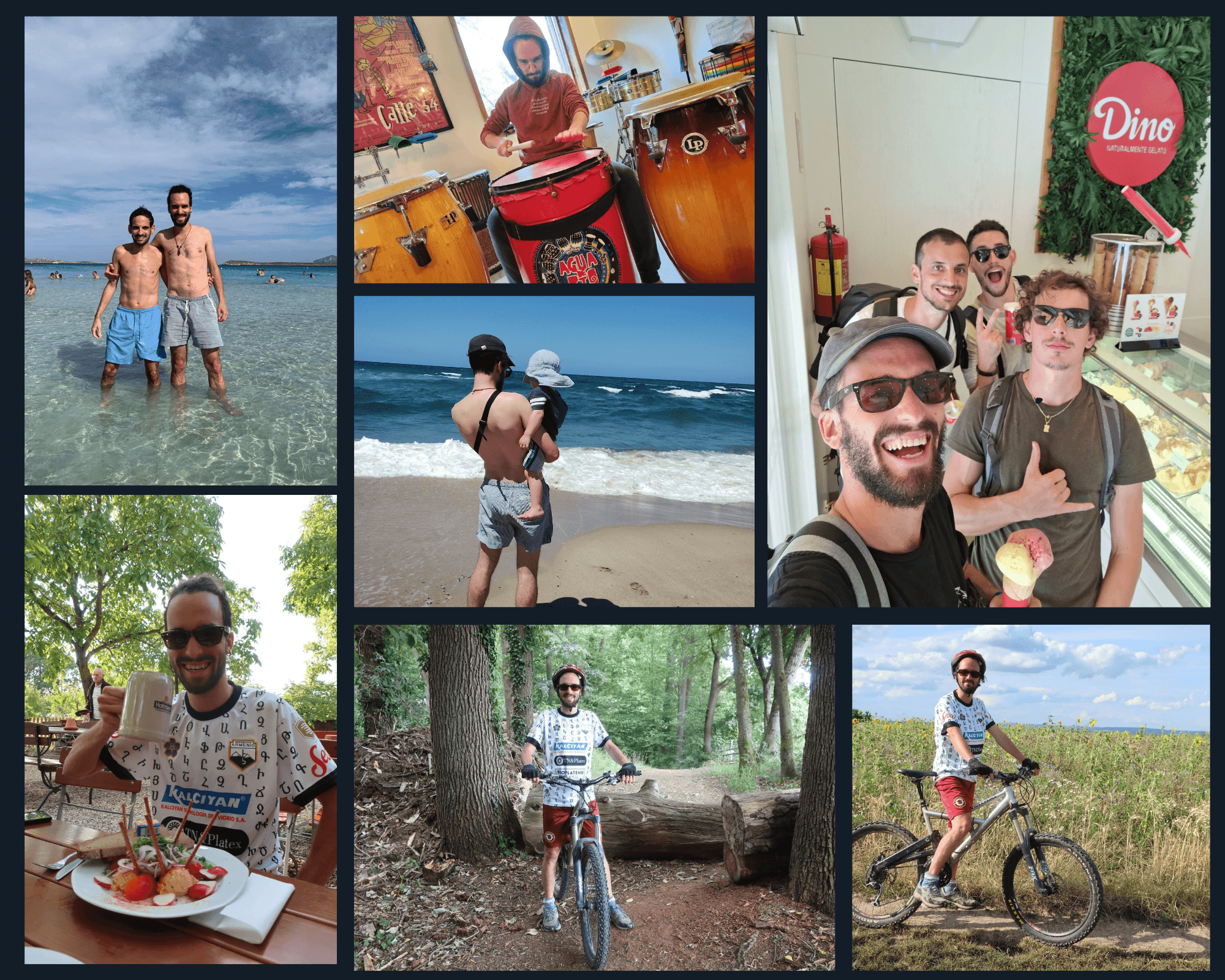
During the summer, Luis enjoyed a holiday in Salou with his wife where he had a great time jet skiing. He also explored many places outside of Valencia and visited Andalusia to see La Alhambra. He went on several local meetups with the team in Barcelona and Valencia.

Franco and his girlfriend embarked on a trip to the north of Argentina, in Salta and Jujuy. There, they ascended to altitudes of 4300 meters and discovered an abundance of Cardones. These plants, similar to cacti, can reach heights of 3 to 4 meters and often live for over a century.

Leo celebrated Christmas with friends and family visiting from Argentina and spent some time playing football on the beach. He also started outdoor swimming with the new equipment that he got for Christmas.
Farewell Andreea: November marked Andreea's last month with us. Although we will miss her greatly, we wish her a wonderful next chapter in life! This photo captures a moment from our goodbye call, where we expressed our gratitude and love for all the hard work, the fun times and moments we shared during her time at Wild Audience.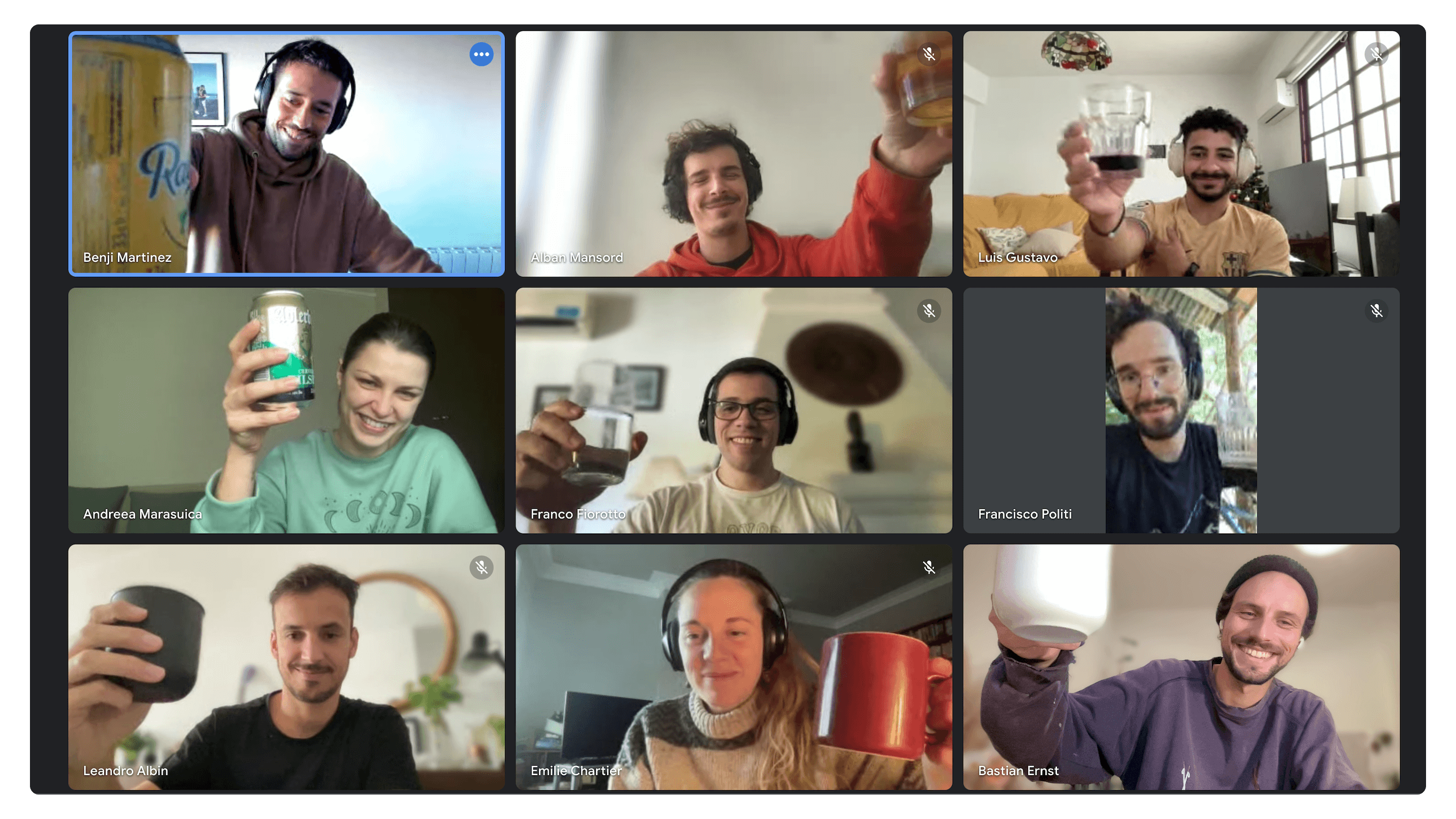
Team retreat 2023: In December 2023, we hosted our yearly virtual team retreat. It's always a nice moment for us to reconnect, reflect together, celebrate our achievements and each other as well as plan the next year.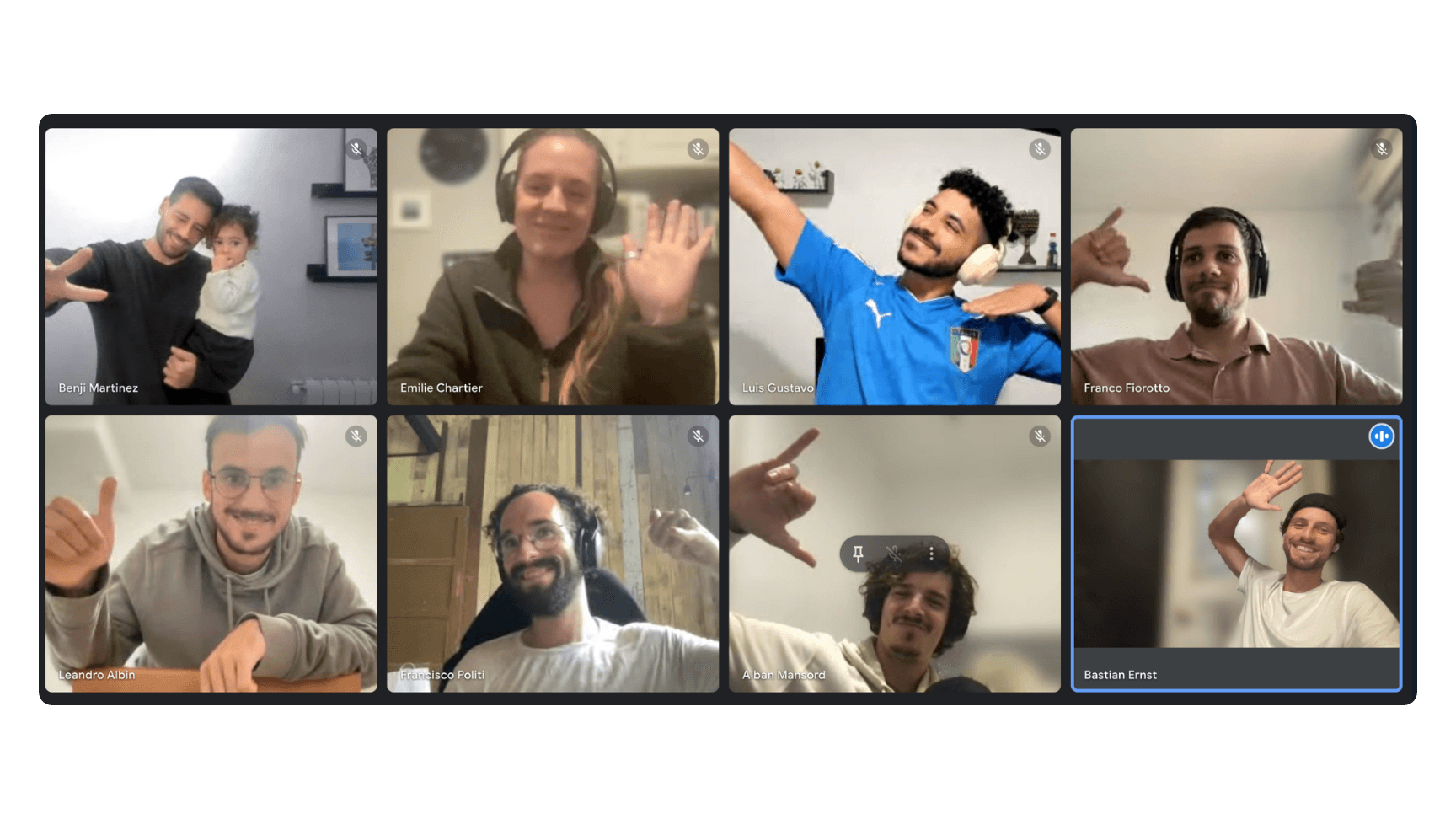
Culture Reflection
“Death seems to be the undoing of everything we value at work: control, growth, productivity, connections. Death can’t be fixed or mastered. It has no care for strategy, talent, or future plans. And so, at work, we have no words for it.” (Julia Samuel, a psychotherapist specializing in bereavement and the author of Grief Works).
Grief is universal, and every single one of us will experience it in our lifetime, yet it is a taboo in today's society let alone in the workplace. Grieving at work is challenging, and it can be difficult as you don't feel like yourself anymore. It can also be as challenging for your co-workers, managers and leaders to know how to support you. It's hard enough to comprehend when you've experienced grief before but imagine when you haven't. Some people don't know what grief is. Most companies have inadequate policies around death and grief when they have some. We need a better and more compassionate approach to grief. Returning to productivity is important, but the company and its leaders have deeper responsibilities. Over the past few decades, work has become a primary support system, significantly impacting our lives and fulfilling our social and economic needs. Work is no longer just about income. We've built work environments and company cultures that foster relationships, community, meaning, and purpose. Work has become central to our identity and plays a significant role in our lives. As such, the workplace has a responsibility it didn't possess before.
While our company culture automatically makes space for grief, and I couldn't ask for a better team in times like this, we simply don't have anything in place and have never thought about it before. I want to make sure we are prepared so that I can support every single one of my team members when they experience grief in the future. This is just a reflection, some thoughts and notes that I made after reading about grief, thinking about it and coming from my own experience navigating it lately. I will use this as a groundwork to create our grief guideline. This will hopefully give people an understanding of what happens for the grieving person and how to support them and also help people who are grieving themselves
Grieving at Work
Grief is a deeply personal and lonely experience that will significantly affect your entire life including your performance and well-being at work. Maintaining the same level of productivity, motivation, and engagement can be difficult when coping with a loss. I returned to work two weeks after my father's passing to regain a sense of normalcy and distract myself from the painful reality. However, I was operating at 5% of my capacity and was merely on auto-pilot. I was indifferent to everything and was seeking a "purpose" as I was losing myself in grief and sorrow. To be honest, I don't recall much of that period, as I was in shock for several months. I was at a loss for words and couldn't discuss it. I didn't know how to respond or what actions to take. My thoughts were clouded, and I was torn between wanting to be present and wishing to be elsewhere. It was a difficult time and still is.
Here are five strategies that have helped me manage my grief at work:
Communicate with your leader and your team
Breaking such news to your team is difficult, even for me. I was in shock and deeply traumatized, and it took a lot of effort to initially talk to Bastian. Discussing it makes it real, and in such situations, reality is the last thing you want. Despite this, the compassion, kindness, and support I received upon sharing the news brought me peace of mind. It reassured me that I could return to work whenever I felt ready, without pressure, and the company would support me if needed.
When I returned to work two weeks later, I sent a message to every team member on Slack. It was important to speak with them directly. I jumped on a call with Bastian, and he focused solely on my needs and how he could help. I expressed my need for time, space, flexibility and patience. Even though I had returned, I was only able to manage a small amount of work and struggled to be present for my team. Discussing my feelings and my father's passing was a challenge. I couldn't lead meetings due to constant tears, and even simple tasks were difficult. Physically, I was present, but mentally, I was elsewhere, struggling and dissociating.
After a month of being a shadow at work, I decided to open up. I wrote a letter to my team explaining my feelings and thoughts. I realised how important it was, for them to understand and be able to help me but also for me. It was almost liberating. It's important to communicate with your team because they are not in your head and can't assume and guess what's happening and how they can help you. However, sharing should come naturally when you're ready, and the choice of what to share should be yours. I know that I need to communicate more with my team if I also want to lead by example but, I am ok to do it at my own pace. There is no timeline or deadline in such situations.
Be patient and kind with yourself (and ask others to be too)
For passionate individuals like me (and everyone really!!), grief can significantly disrupt work routines and progress. It can be very frustrating. Instead of pressuring yourself to perform like you used to, it's crucial to be patient with yourself and your emotions. You won’t be back to normal for a while so don't beat yourself up. Grief makes it hard to concentrate and focus. You may also notice that your creativity and cognitive abilities are slower for a while since your mind constantly wanders elsewhere. Or, tasks that once took five minutes now take an hour. I am slowly improving but I am still far from being back to normal. Here are the things I felt when returning to work which was really hard to accept and manage sometimes:
A higher than normal rate of errors or inaccuracies
Questioning if you should quit your job or find a new one
Daydreaming and/or dissociating
Difficulty concentrating or focusing on a specific task
Difficulty to think clearly
Difficulty to do multiples things and work on too many projects
Being slower and taking double the time to accomplish something
Failing to accomplish more than you wanted to get done
Feeling overwhelmed
Feeling sleepy or exhausted during the workday
Forgetfulness
Irritability or impatience
People are often very self-critical when grieving. I am already very self-critical in general so when grieving this is ten times worst. I am trying my best to accept that it will be like this for a while and that's ok. It's important to allow yourself to be a grieving human while working, to be kind and patient with yourself. I am giving my 100% right now but my 100% nowadays looks like 50% maybe.
You will also feel overwhelmed so cry, scream, or do anything else that helps release the emotions. If it means setting boundaries at work to have a sobbing session, then do so. If there are days when you feel energized and motivated at work, don't feel guilty about it either. Just take it as it comes.
Give yourself time to feel, process and adjust to this new reality. Grief comes and goes in constant waves, it’s always going to be there. There’s no getting over the loss of a loved one, but you can find ways to incorporate the loss into your life as you move forward and it will take time.
Schedule time for yourself and your grief
When you return to work, the best thing to do is to schedule breaks in your calendar where you can go for walks, take a nap, do some journaling, go swimming, drink a cup of tea in the sun or do anything else that is comforting away from your laptop. Having that time will be important more than ever. I’ll be honest, at the beginning my grief had full control over me, and doing things alone was not possible let alone things that used to give me joy. My routine was working and crying. After a while, I regained a bit more control and started doing things again with people and on my own again. This “me time” away from my computer has become essential for me to function at work.
I also started reading about grief which helped me understand it more and how I could manage it in my daily life and at work. What I found was interesting and I could read a lot of people say that grief needs dedicated time, and a structure so it doesn’t stop you from even performing tasks in your daily life and doesn't interfere too much. They suggest finding a way to block time for your grief when you can focus on the pain, cry, scream, do anything to feel the pain and let it out. By giving yourself and your grief a time and place, you give yourself a chance to keep up with work, and with life while honouring your pain and your loss.
I believe it has been beneficial to me, and I appreciate the concept, but only to a certain degree. I don't want my grief to dominate my life, yet I also don't want to completely suppress my grief. There will be moments when you're overwhelmed by emotions, and it's healthy and acceptable to let them come and express them. It's all about balance. It's also a deeply personal journey, and you need to discover what suits you, your life, and your grief.
Surround yourself and build a support system
Find professional help and support via grief or mental health counsellor who can be your guide through the process. It’s confusing and you might be lost for a while. For me, I had lost my inner compass, nothing made sense anymore, I couldn’t eat, couldn't sleep and couldn’t even breathe. I wasn’t even functioning on a basic level not to mention the dark, negative and intrusive thoughts I had about life. This can be difficult to manage for you and your loved one so it’s important to seek professional help and be open to it after a while. There is a limit to what your loved ones can handle especially if they are dealing with grief themselves and simply because they aren't equipped to deal with this either.
If you aren’t ready for one-on-one discussion yet, there are many grief groups available, often for free, online or in person. There are numerous resources on coping with grief, including supportive social media accounts that can help you feel less alone. It's well-known that bottling up emotions can have negative long-term mental and physical effects. Don't hesitate to rely on your support network, from close friends to family members. Although grief can be isolating, and you might feel the urge to isolate yourself, it's crucial to find the strength to let others in. You don't need to face this difficult experience alone any more than necessary.
I have been fortunate to have an exceptionally supportive partner and amazing friends who have been there for me since the day my dad passed away. My sister and I have been pillars of strength for each other, and her children have given us a purpose. Despite this, I need professional help so don't shy away from it. And don't shy away from the people in your life.
Create checklists, and to-do lists and ask for help.
Grief often results in feeling spacey. Initially, my brain didn't function at all, and even today - four months later - I find it harder to concentrate than before. It's common to forget things and make more mistakes, which is frustrating.
Now, I write everything down, both for work and in my personal life, which may amuse some people, but I find it necessary. I write to do lists and when I don't, I forget and make mistakes. I recommend noting even the things you wouldn't typically bother with. For important tasks, create a detailed checklist and review it twice or ask a colleague to check your work. This approach helps me declutter my mind and alleviate some stress, which has been overwhelming lately.
Being open about your struggles and asking for help when needed is crucial. I'm getting better at this since I got to a point where I just had no choice but to seek help.
Often people are wanting to help and support you but they don't know how.
Supporting an Employee Who's Grieving
Being an empathetic leader involves supporting your employees when personal life circumstances divert their attention and focus from work. You will be remembered for the way you handled a situation like this. This can involve providing flexible working arrangements or time off, reducing workload, offering access to counselling, offering financial help and fostering a culture of empathy and understanding. Encourage open communication and let your employees guide you on what they need and let them take the lead. Each person will have a different experience and different needs depending on their situation.
Here is some tips on how you can best approach this situation:
Express your sympathy and acknowledge their pain
It can be challenging to find the right words for someone who is grieving. You cannot change or fix the situation. You cannot fix death. The most helpful thing you can do is to offer empathy and compassion, provide support, and be ready to listen. It's crucial to communicate that you care about them and are available for support. Acknowledge the loss they have experienced and ask what they would like you to share with others at work.
Ask them what they need
Grief is unpredictable by nature and affects different people in different ways, making it extremely difficult to gauge, manage, or balance it with professional expectations and demands. It's tricky to know how your employee feels without asking them because someone can seem physically present and responsive, but emotionally, they could be disassociating, with their mind world away. So that’s why it’s best to have an open conversation where you can ask them how you and the company can best support them. No matter what they express, try to use the resources you have to meet their needs. Remember, they may be unresponsive, so have patience.
Understand that work isn’t and cannot be a priority right now
When losing a loved one, grief is at the forefront of our minds, it shifts our priority and focuses away from any KPIs, deliverables, goals and responsibilities. Not only grief takes up all the space but you also have to deal with the shock, the trauma, and daily life, organise funerals and all the responsibilities and expectations that come with and after such a life event.
This period of my life is a total blur and for a good three months, I was doing my best to survive and I don’t mean this lightly. I couldn’t eat and sleep for a month which impacted my physical health tremendously so I could barely function. I couldn’t be left on my own without having a panic attack and feeling like I didn’t want to be alive. That’s a brutal reality and I share this because grief is so taboo in the workplace (and in life in general!) but so important to talk about. As you can imagine in this state of mind, my only priority was to survive.
It’s important to note that this was my experience and people’s responses differ with the kind of loss they have experienced—how close they were to the person and the nature of the death itself. Unexpected deaths, violent deaths, and suicides are likely to be more traumatizing. All these factors should be taken into account to make decisions about work and approach the grieving person.
Be human
This may seem obvious, but there are times when you need to be a boss giving critical feedback and others when you need to be a human. This means letting the employee know you’re there for them. Support is key when a person is grieving, and comfort is often the thing they will search for the most.
If your company has the means to contribute to the employee and their family somehow. This may mean chipping in to cover a portion of the funeral or memorial service (funerals are extremely expensive and financial distress could come with such life event especially if it is unexpected), sending flowers, a card, food, a phone call, going to the funeral if you’re in the same area (and you're not working remotely), or anything else that feels appropriate (every country has their ways and traditions around death, look into it before doing anything). In the aftermath of a loss, you will be touched by the small things, gestures, everything and anything that matters.
Don’t hesitate to be open with your grieving employee about what the policy is for returning to work and whether it might be flexible, and assure them that colleagues will be glad to see them when they do return. While some managers might find it awkward to discuss an employee’s return to work in the immediate aftermath of death, the grieving person often longs for clarity. At a moment in which life feels like a whirlpool, work can be a familiar comfort and safe space.
Be patient:
Most people return to work after a few days or weeks, often due to inadequate policies. However, some might do so as a respite from grieving, seeking solace in an area where they still have some control. This was my experience.Some individuals may require additional time to cope with their grief, either due to practical reasons or the overwhelming nature of their emotions. In certain instances, employees may bring their grief into the workplace, seeking acknowledgment and understanding.
But grief typically remains intense for months, and even years. So even when the return to work has been handled sensitively, leaders and managers can’t assume that everything will go back to business as usual. The person in mourning will continue to be in the grip of intense confusion, exhaustion, and pain. Furthermore, the months that follow the initial shock of loss are often a time of uncertainty. We go back and forth between feeling pain and wanting to move on and it often manifests as inconsistency. One moment we manage to work on challenging project and the next we cry because we can't answer a single email. This inconsistency is confusing and irritating. As we grapple with the absence of our loved ones, we gradually become aware of our own emotional and physical detachment.
Yearning to return to normalcy and to reclaim the essence of who we were before, is a common and strong sentiment. Yet, it feels impossible. Leaders and managers must recognize that grief casts its shadow over qualities often prized as "talent" in the workplace—qualities such as focus, consistency, and drive. It's all about accepting and "offering permission to be both a functioning employee and an incredibly sad, grief-stricken human being at the same time.”
Your grieving employee will find refief in knowing that nothing has changed and that to them, you're the same but you simply adjusted expectations for a while. This will also help the grieving employee accept that even though they can't return to "who they were before," they can still be just as talented, committed and valued following their loss.
Supporting a grieving co-worker
Everything mentioned in the section above is relevant and important for co-workers to take into account and follow, but, I believe there is a much bigger responsibility on managers and leaders and wanted to separate both sections.
So in this section, I thought I would briefly approach the topic of what to say to a grieving person. To be honest, it can be awkward and difficult knowing how to approach someone who's grieving. Some people may find words easily, while others may struggle or say nothing at all. A helpful strategy could be to express your condolences, acknowledge their pain, offer to listen, and show empathy. Be mindful of your words. Many people understandably worry about saying the 'wrong thing' to someone who is grieving. However, it's important to simply speak with compassion and acknowledge their pain.
Here are a few things you can say to share your sympathy and show that you care and that you’re sympathetic to their emotional distress so they feel less isolated:
“I’m sorry for your loss”
“You're in my thoughts/I’m thinking of you."
“I know this is hard for you”
“I’m thinking of you”
“I am here for you, if you need anything or just need to talk”
Here are a few things you should not say to someone who is grieving because you can’t understand what the other person is feeling, you can easily offend the grieving person, you could invalidate their feelings and struggle, and it’s nobody’s place to tell you when to start moving on:
“I know how you’re feeling”
“Don’t worry, you’ll feel better soon.”
“They are in a better place”
“How are you doing?”
“How is life?”
“Move on with your life”
"I don’t know what I would do if my [deceased’s relationship to the bereaved] died."
Don't assume about what happened and don't ask grieving people what happened. This is an extremely personal and sensitive topic, the grieving person will share what they want to share when they want to share it.
The most beneficial actions you can take are to express your sympathy, offer to be present when they need you, be kind and patient with them, provide a listening ear, and regularly check in with them.
This concludes my exploration of grief in the workplace. I hope this was insightful and I will share more about our grief guideline when it's done. Now here is a general update of what we've been doing and what's coming next in terms of People and Culture.
People & Culture update
We have made significant progress in our 4-day workweek trials and compensation philosophy, which are part of our efforts to build a supportive and inclusive culture. Our updated compensation philosophy now includes a level system and salary matrix, and the 4-day workweek trial has been successful for everyone (currently working on a tailored version for our Customer Success Specialist).
As mentioned previously, Andreea left us at the end of last year which means that I spent a lot of time in Q4 working with Benji to hire our new Customer Success Specialist. Ursula started in February and we are already in love!! I will introduce her in my next report.
What are we going to do in the next few months?
Work on a new version of our salary matrix and level system
Reintroduce team challenges to add some fun in between big projects.
Organise local meetups for team members to spend quality time together.
Attending the Running Remote Conference in Lisbon, Portugal in April.
This concludes my report, everyone. If you've made it so far, thank you for taking the time to read it. It means a lot, especially this one. I hope you'll get value from it and that it will make you think. As always, if you have any questions or feedback please do share it with me. :)